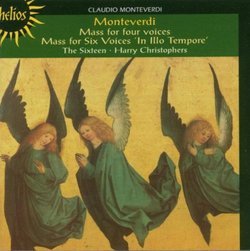| All Artists: Claudio Monteverdi, Harry Christophers, The Sixteen, Margaret Phillips Title: Monteverdi: Mass for four voices; Mass for Six voices 'In Illo Tempore' Members Wishing: 2 Total Copies: 0 Label: Hyperion UK Release Date: 10/14/2003 Album Type: Import, Original recording reissued Genre: Classical Styles: Opera & Classical Vocal, Chamber Music, Historical Periods, Baroque (c.1600-1750), Classical (c.1770-1830) Number of Discs: 1 SwapaCD Credits: 1 UPC: 034571151458 |
Search - Claudio Monteverdi, Harry Christophers, The Sixteen :: Monteverdi: Mass for four voices; Mass for Six voices 'In Illo Tempore'
 | Claudio Monteverdi, Harry Christophers, The Sixteen Monteverdi: Mass for four voices; Mass for Six voices 'In Illo Tempore' Genre: Classical |
Larger Image |
CD Details |
CD ReviewsMonteverdi Looks Backward Giordano Bruno | Wherever I am, I am. | 10/08/2008 (5 out of 5 stars) "If I played this CD blind (skipping the two motets) for almost any aficionado of 'early music' and asked who the composer was, I doubt many listeners would guess Claudio Monteverdi. The two masses recorded here are pure 'Franco-Flemish' polyphony, composed in what Monteverdi himself retrospectively called "prima prattica" - first practice - constructed around the tenor and without a hint of basso continuo. Such music was totally out of fashion by the beginning of the 17th Century, replaced as the standard of composition by the new forms of the oratorio, and displaced from the liturgical celebration of the mass by the theological mandates of the Counter-reformation. In a letter written in 1634, Monteverdi claimed that he had written a mass for Christmas every year of his career in Mantua. If so, those masses are all lost; they were never published simply because there was no market for such old-fashioned stuff. Around 1610, the year when Monteverdi wrote his most famous music, the Vespers of the Virgin Mary, he also set himself the task of re-composing the polyphonic motet In Illo Tempore, by Nicholas Gombert, already half a century old. A letter exists, from a Mantuan singer to Cardinal Gonzaga, which states: "Monteverdi is having printed an a capella mass for six voices written with much study and toil..." The toil certainly paid off! This is a much finer piece of music than anything Gombert ever produced. Like Gombert, however, Monteverdi seldom thins the voices of his six-part polyphony. The result is a dense choral texture of awesome majesty. Monteverdi in one stroke proved himself as skillful a polyphonist as any before or after, even including Josquin and Brumel. The four-voice mass recorded here is one of two others by Monteverdi that have survived. Its date of composition is unknown, though musicologists assume that it was written after 1610. It's a work of great thematic economy, quite reminiscent of Josquin at his best, though somewhat more florid in decoration and closer to Monteverdi's madrigal style. It also is a sublime piece of music, probably the best Renaissance mass written in the Baroque era. Since this is the only recording of these masses together, it's a huge relief to be able to say that Harry Christophers and The Sixteen sing them well. Their performance is a big-space big-choir sound, something that's often prone to stodginess and distortion, but The Sixteen are a disciplined ensemble and etch the lines of polyphony in acoustic ear-space with energy and elegance. A must-have CD for all Monteverdi lovers! There is a Mass for Four Voices included in the compendium "Selva Morale e Spirituale, which has been recorded by various ensembles with even better musical 'craft' than The Sixteen could approach, but it is a different composition. This mass derives from a posthumous publication of 1650." Fantastico Sergio Murilo Monteiro | Rio de Janeiro, Brasil | 09/02/2007 (5 out of 5 stars) "Fantástico.
Execução perfeita e ótima qualidade de gravação. A melhor versão que já ouvi do Cantate Domino e da Missa da capela para 4 vozes. As vozes são esplêndidas, claras e muito bem equilibradas. Os instrumentos são precisos e estão à altura do madrigal. " |
